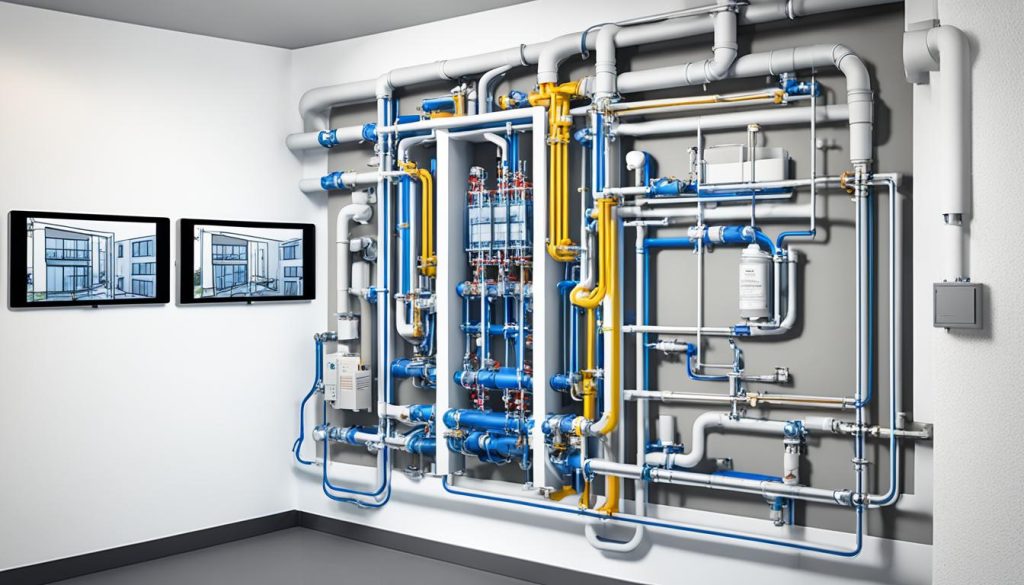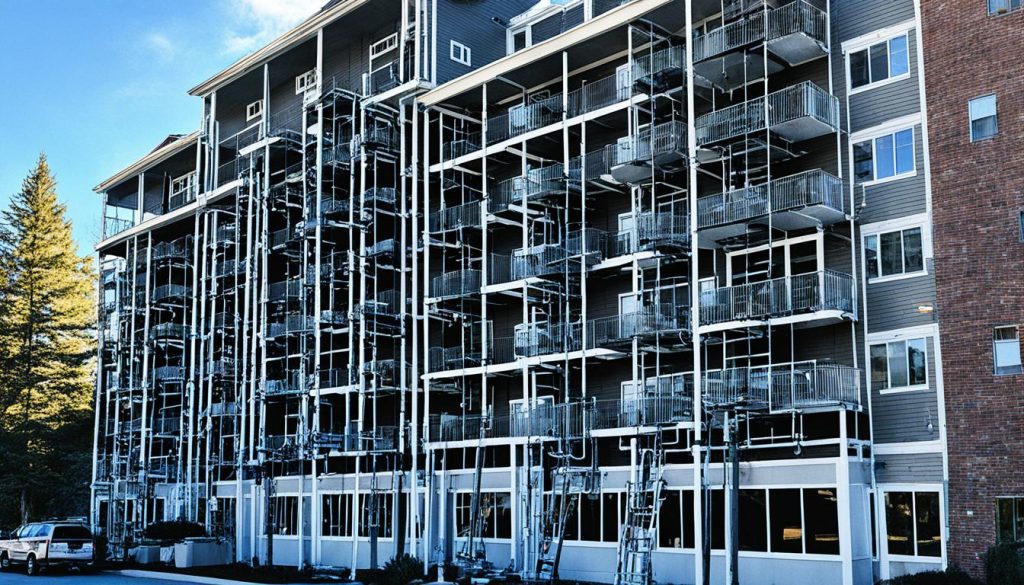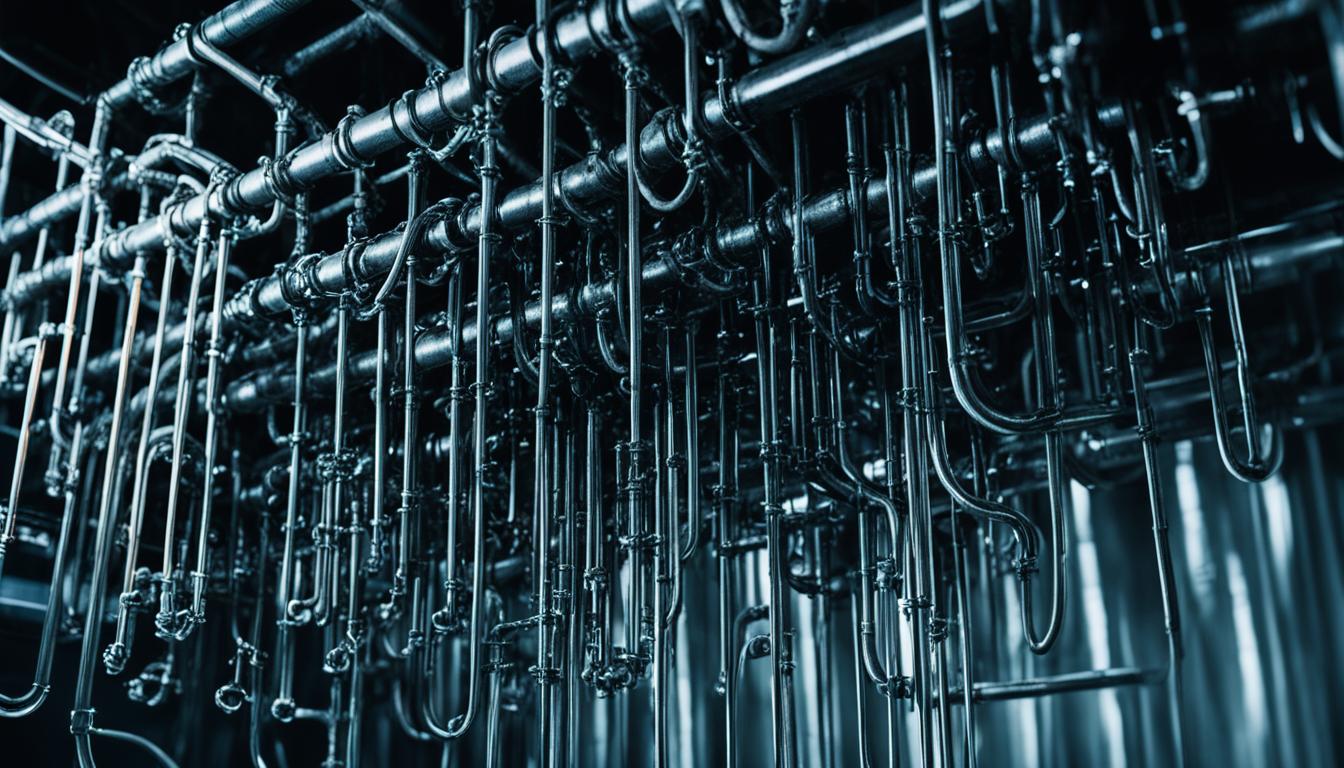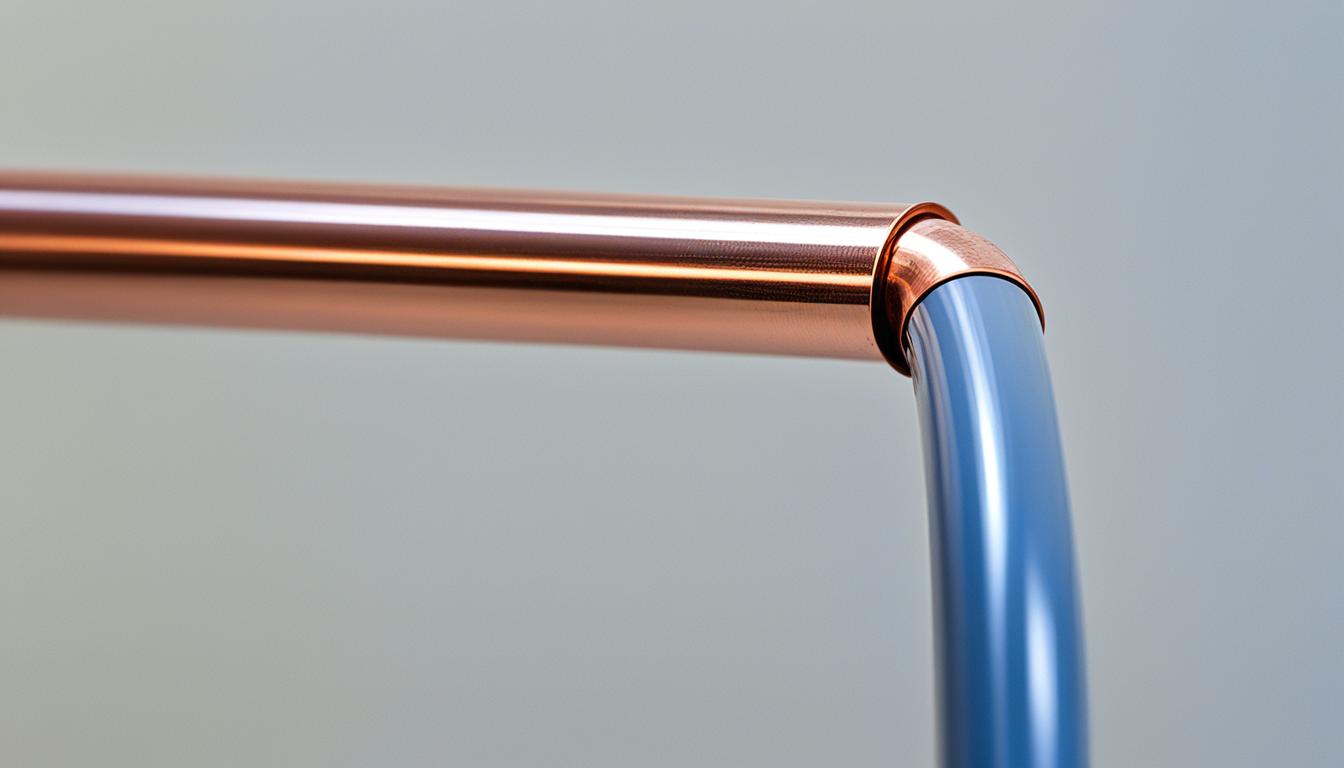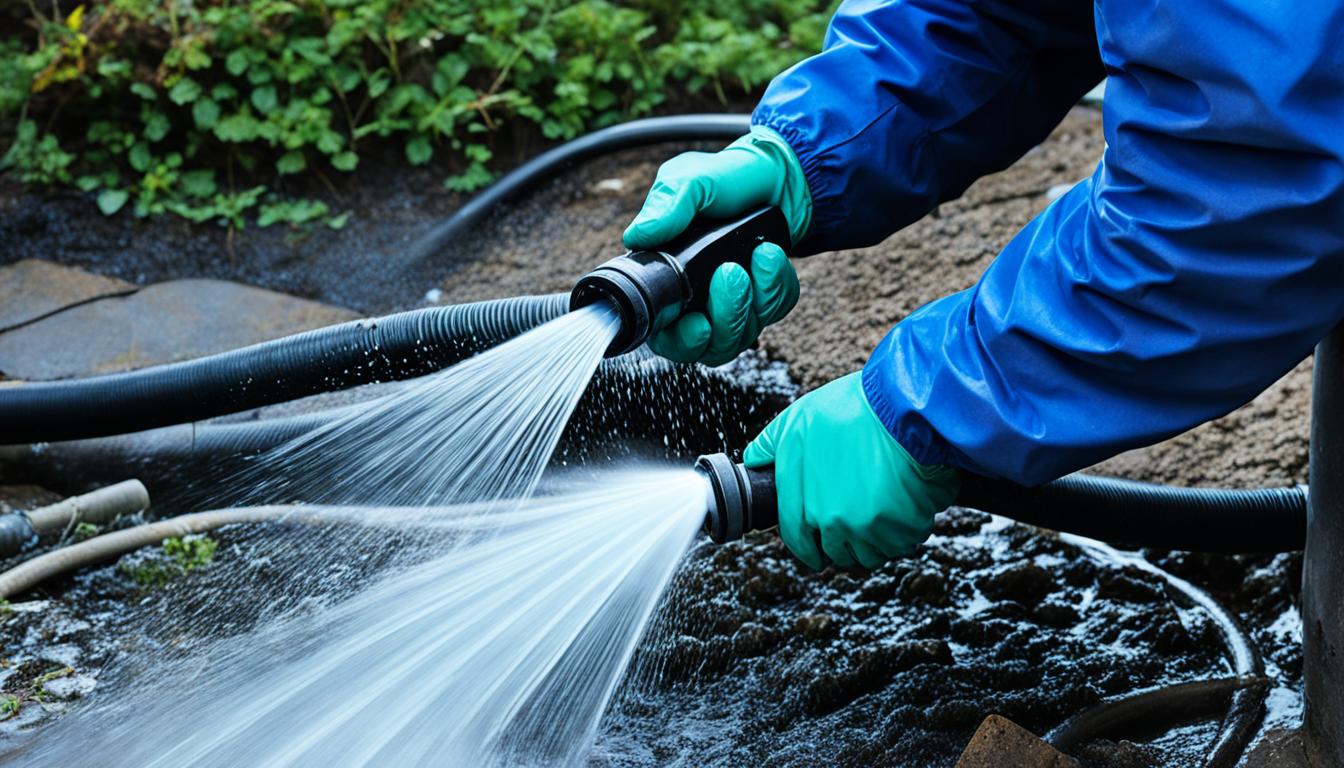Condo Wall Pipes: Who is Responsible?
Did you know that in a condominium building, there can be thousands of pipes hidden inside the walls? From drainage pipes to potable water pipes, these intricate systems ensure the smooth functioning of the building. But who is responsible for the maintenance and repairs of these vital components?
In this article, we will explore the complex world of condo plumbing and shed light on the responsibilities of both the condo corporation and individual unit holders. Understanding these responsibilities is essential for all condo owners to navigate potential issues and ensure a well-maintained plumbing system in their units.
Key Takeaways:
- Condo corporations are responsible for maintaining and servicing public pipes.
- Individual unit holders are responsible for the pipes within their units.
- Clogged drains and corroded pipes are common plumbing issues in condominiums.
- Clear communication and knowledge of condo agreements are crucial in resolving plumbing issues.
- Condo plumbing responsibility can vary depending on the building and agreements in place.
Common Plumbing Issues in Condominiums
In condominiums, plumbing issues are not uncommon and can cause significant headaches for both unit holders and condo corporations. Understanding the most common plumbing issues in a condominium and the condo pipe maintenance regulations is crucial for maintaining a well-functioning plumbing system. Let’s explore some of the common plumbing issues that can arise in condominiums.
Clogged Drains
Clogged drains are one of the most frequent plumbing issues in condominiums. They can occur due to various factors, such as debris buildup, grease accumulation, or inadequate drainage systems. While clogged drains within the individual units are typically the responsibility of the unit holders, more severe clogs in the main sewer line or waste stack may fall under the jurisdiction of the condo corporation.
Corroded Potable Water Pipes
Corrosion is another common problem found in condominium plumbing systems, especially in older buildings. Corroded potable water pipes can lead to reduced water flow, leaks, and even water contamination. The responsibility for corroded pipes within a unit usually falls on the unit holder, while corrosion within common areas may be the responsibility of the condo corporation.
Broken Pipes
Broken pipes can cause significant water damage and disruption to residents. Whether it’s a burst pipe or a leak, prompt action is necessary to minimize the damage. Unit holders are generally responsible for the repair of pipes within their units, while the condo corporation should cover any leaks in common areas. However, when it comes to shared pipes, the responsibility can be more complex and may require further evaluation.
Backed-Up Sewers
A backed-up sewer is a severe plumbing issue that requires immediate attention. While the responsibility for a clog in the main sewer line or waste stack usually falls on the condo corporation, individual unit clogs may require further evaluation to determine the cost responsibility.
These are just a few examples of the common plumbing issues that can arise in condominiums. It’s essential for unit holders and condo corporations to be aware of their respective responsibilities and adhere to condo pipe maintenance regulations to ensure the proper functioning of the plumbing system.
Comparison of Responsibilities for Common Plumbing Issues
| Plumbing Issue | Responsibility of Unit Holder | Responsibility of Condo Corporation |
|---|---|---|
| Clogged Drains within Unit | Yes | No, unless it’s a severe clog in the main sewer line or waste stack |
| Corroded Pipes within Unit | Yes | No, unless it’s corrosion within common areas |
| Broken Pipes within Unit | Yes | No, unless it’s a leak in common areas |
| Backed-Up Sewers within Unit | Yes, unless it’s a clog in the main sewer line or waste stack | No, unless it’s a clog in the main sewer line or waste stack |
Understanding Condo Plumbing Responsibilities
To navigate the responsibilities related to condo plumbing, it’s essential to have a clear understanding of the division of duties between the condo corporation and individual unit holders. The condo corporation holds the responsibility for maintaining and repairing public pipes within the condominium building. On the other hand, unit holders are accountable for the pipes within their respective units.
This means that if there are any issues with the pipes within a unit, such as burst pipes or leaks, it is the responsibility of the unit holder to address and resolve them. Regular maintenance and repairs of these pipes also fall under the unit holder’s duties. It is important to note that these responsibilities extend to both drain pipes and potable water pipes within the unit.
However, when it comes to shared resources, such as pipes and walls that serve multiple units, the responsibility for maintenance and repair can be more complex. It is crucial for the condo corporation and unit holders to maintain clear communication and have a thorough knowledge of the condo agreement to determine the specific responsibilities in such cases.
To ensure a smooth functioning plumbing system in a condominium, the condo association has established certain guidelines for pipe repair and maintenance. These guidelines outline the responsibilities of both the condo corporation and the unit holders, ensuring clarity and accountability.
In summary, understanding condo plumbing responsibilities involves recognizing the division of responsibilities between the condo corporation and individual unit holders. Clear communication, knowledge of condo agreements, and adherence to condo association pipe repair and maintenance rules are essential to effectively navigate these responsibilities.
Toronto Condo Plumbing Responsibility
In Toronto, the responsibility for condo plumbing maintenance and repairs can vary depending on the specific building and agreements in place. Generally, condo boards are responsible for the building’s plumbing, including drainage away from the building and connections to the municipal water system. Individual owners, on the other hand, are responsible for ongoing maintenance within their units, including regular inspections and repairs.
As a condo owner in Toronto, it’s crucial to understand your specific plumbing responsibilities. Familiarize yourself with your condo agreement to ensure clarity and compliance. Regular inspections and maintenance can help prevent costly issues and ensure a smoothly functioning plumbing system in your unit.
To help you navigate condo pipe maintenance guidelines in Toronto, here are some key points to keep in mind:
- Read and understand your condo agreement to know your responsibilities regarding plumbing maintenance and repairs.
- Regularly inspect your unit’s plumbing system for any signs of leaks, clogs, or other issues.
- Promptly address any plumbing problems to prevent further damage and minimize repair costs.
- Communicate with your condo board regarding any concerns or questions about plumbing responsibilities.
- Consider hiring a professional plumber for regular inspections and maintenance to ensure the longevity and efficiency of your unit’s plumbing system.
By staying proactive and informed, you can effectively manage your condo plumbing responsibilities in Toronto and maintain a comfortable living environment for yourself and your neighbors.
Navigating Condo Water Pipe Ownership and Maintenance
Understanding the ownership and maintenance of condo water pipes is crucial for condo owners in Canada. When it comes to condo plumbing, the responsibility is divided between the condo corporation and individual unit holders. The condo corporation is responsible for maintaining the public pipes, while individual unit holders are responsible for the pipes within their own units. This means that as a condo owner, it’s important to stay proactive in maintaining and repairing your own water pipes to prevent potential issues like burst pipes or leaks.
To navigate condo water pipe ownership and maintenance effectively, prompt action is key. It’s essential to address any plumbing problems as soon as they arise to limit damage to other units and prevent costly repairs. Moreover, open communication with the condo board is vital. Make sure you are familiar with the regulations and guidelines set by your condo association regarding pipe maintenance. By understanding your rights and responsibilities as a condo owner, you can confidently navigate the challenges that may come with owning and maintaining water pipes in a condominium.
In conclusion, condo water pipe ownership and maintenance require a collaborative effort between the condo corporation and individual unit holders. While the corporation takes care of public pipes, it’s the responsibility of condo owners to maintain and promptly repair the water pipes within their units. By staying proactive, communicating with the condo board, and being aware of your rights and responsibilities, you can effectively navigate condo water pipe ownership and maintenance in Canada.
Source Links
- https://drpipe.ca/plumbing-system-works-in-a-condo-unit-in-toronto/
- https://theprovince.com/life/homes/condos/condo-smarts-how-do-we-know-if-pipes-are-common-property
- https://absolutedp.com/toronto-condo-plumbing-who-is-responsible-for-what
- Investing Wisely: How Windows & Doors in Boost Property Value and Financial Health - April 24, 2025
- The Financial Impact of Personal Injuries: Why Legal Help Matters for Business Owners - April 16, 2025
- The Hidden Financial Costs of Domestic Assault: What Business Owners Need to Know - April 16, 2025
